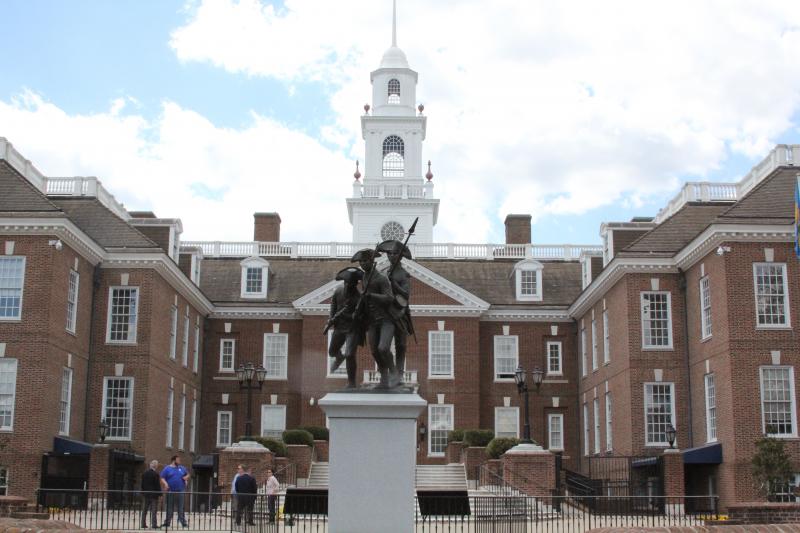Delaware's General Assembly will pick up from the end of its last session and continue to meet virtually as the 151st session convenes Tuesday, Jan. 12.
In December, House and Senate leaders announced that the session will be held virtually through January in order to safeguard the health and welfare of legislators, staff, and the public.
Representatives and senators will gather in virtual meetings of their respective chambers to take their oaths of office, formally elect the speaker of the House and president pro tempore of the Senate, and adopt rules and procedures for conducting legislative business.
The opening session will be livestreamed on the General Assembly’s YouTube channels. Throughout January, committee meetings and legislative sessions also will be conducted virtually and livestreamed, with provisions to facilitate public participation during committee meetings.
“The COVID-19 pandemic continues to take a brutal toll on families across Delaware, and after much discussion and deliberation, we determined that there was simply no way for the General Assembly to safely convene our new legislative session in person,” said Speaker of the House Rep. Pete Schwartzkopf, D-Rehoboth Beach. “Nevertheless, the people of Delaware elected us to do a job, and when Jan. 12 gets here, we intend to get to work considering bills, holding committee hearings, voting on legislation, and doing all the things that the General Assembly is expected to do, just in a different format.”
After January, officials said, a group of legislators and staff will reevaluate the need to meet virtually, prioritizing health and safety, and adhering to guidelines from public health experts.
A 2018 amendment to Delaware's Constitution allowed legislators to conduct business at alternative locations during an emergency, ending a previous law that required the General Assembly to meet in person in Legislative Hall to conduct business.
“One silver lining to all of this is that the public will have more access than ever before to the business of the Legislature. Throughout the entire history of the Delaware General Assembly, if you wanted to deliver a public comment during a committee meeting, you had to be in that room in Legislative Hall. If you wanted to watch a roll-call vote, you had to be in the House or Senate chamber,” Schwartzkopf said. “But now, every committee meeting we hold, every floor debate we have, and every vote we take will be streamed live online.”
In June 2020, the General Assembly conducted business virtually and satisfied its constitutional duties to prepare and pass the annual state budget bills, along with some legislation and measures related to the pandemic. The inclusion of committee hearings in the Legislature’s virtual meeting plan will allow for consideration of a more robust agenda moving forward, Democratic leadership said.
Senate President Pro Tempore-elect David Sokola, D-Newark, said even though the 151st General Assembly will begin in a virtual setting, legislators will continue to tackle economic, public health, and racial issues.
“This pandemic has laid bare long-standing fractures in our society, and we will not let the fact that we're unable to meet in person prevent us from making progress for Delawareans who can't afford to wait any longer,” Sokola said.
The rules of each chamber, which are adopted at the outset of every legislative session, will contain new provisions to ensure virtual sessions and committee meetings are conducted in an orderly and transparent manner, officials said. The rules will spell out requirements for printing legislation and for affixing legislators’ signatures to bills and committee reports when needed. The procedures will also include a method to verify each legislator’s identity and ensure they are able to participate in virtual sessions, as well as codify a means for the public to observe and participate in legislative proceedings.
More details on meeting dates and times will be announced in the coming weeks. Legislative Hall will remain closed to the public.
Republicans oppose considering controversial bills virtually
House and Senate Republican leaders say holding the legislative session virtually blunts the ability of citizens to make their voices heard on controversial bills.
In a statement released a day after the announcement was made to begin the General Assembly virtually, Senate Minority Leader Gerald Hocker, R-Ocean View, and House Minority Leader Rep. Danny Short, R-Seaford, said they agree with initially holding legislative proceedings virtually. However, they both oppose considering any controversial legislation while citizens cannot meet with legislators, testify at committee hearings, or attend floor proceedings in person.
“It is absurd to eliminate personal contact with citizens and then claim you are doing them a favor by providing the feeble substitute of online access,” Hocker said. “A Zoom session or any other virtual meeting is an inadequate replacement for face-to-face interaction. Online meetings are easy to control and manipulate. They lack the emotion, energy, and intensity that is tangible when dozens or hundreds of people come to Legislative Hall to advocate for a subject about which they are passionate.”
Both Short and Hocker said the Legislature should limit its work in early 2021 to essential bills and measures on which there is little disagreement. A large portion of the bills the General Assembly handles are minor, uncontentious, and tend to clear the Legislature with broad agreement, such as an annual tweak to the Bond Bill, Short said.
“It's these bills we should be considering in January, and perhaps March, if we're still meeting virtually then,” he said. “Sen. Sokola's comments – which I did not see until after he issued his press release – leave little doubt he intends to start immediately considering potentially divisive bills. Claiming these bills are so important and urgent that they cannot possibly be delayed until early spring is disingenuous. It is an apparent attempt to diminish any dissent by keeping it online and at a distance – minimizing the rhetorical weight of those objecting to these likely contentious policies. This is a needlessly provocative way for him to begin his tenure as the leader of the Senate.”
Melissa Steele is a staff writer covering the state Legislature, government and police. Her newspaper career spans more than 30 years and includes working for the Delaware State News, Burlington County Times, The News Journal, Dover Post and Milford Beacon before coming to the Cape Gazette in 2012. Her work has received numerous awards, most notably a Pulitzer Prize-adjudicated investigative piece, and a runner-up for the MDDC James S. Keat Freedom of Information Award.






















































